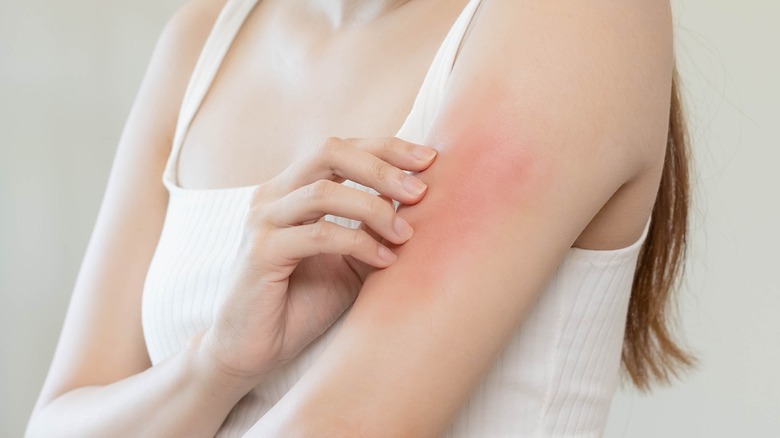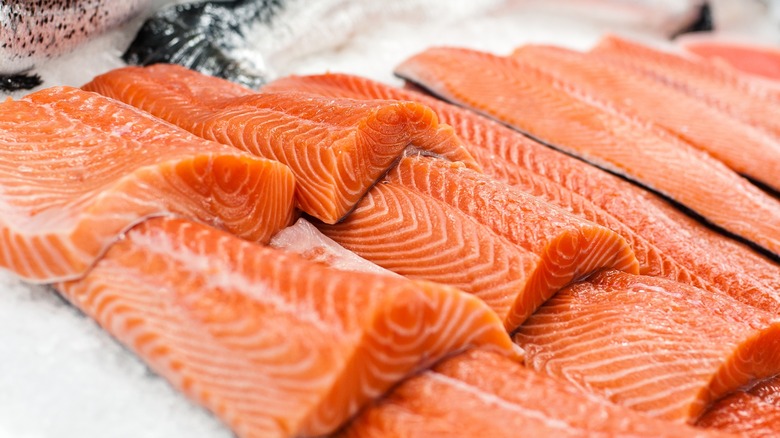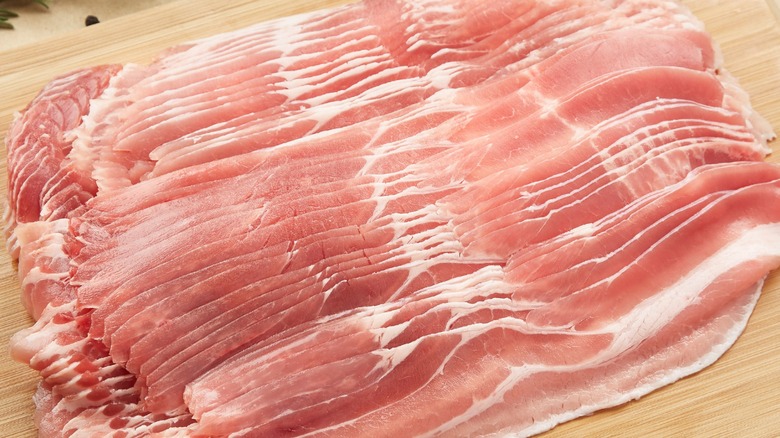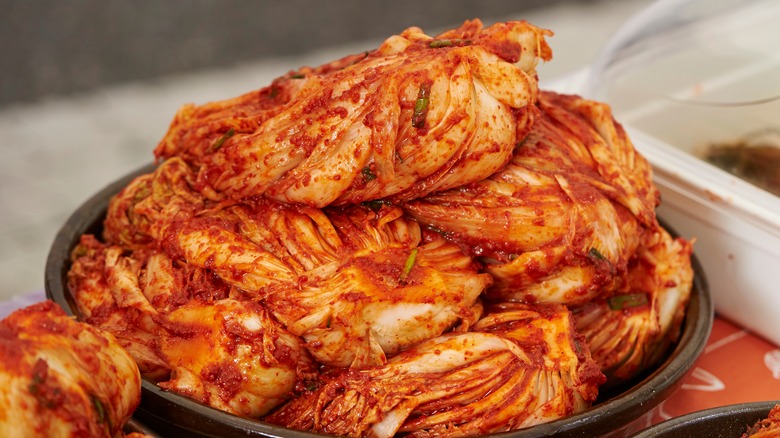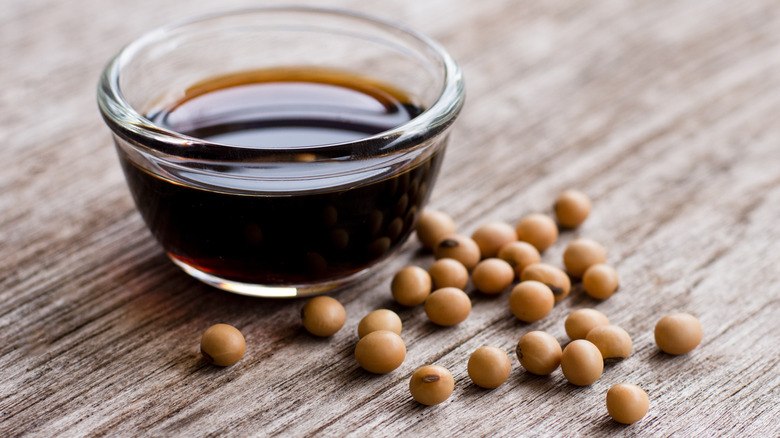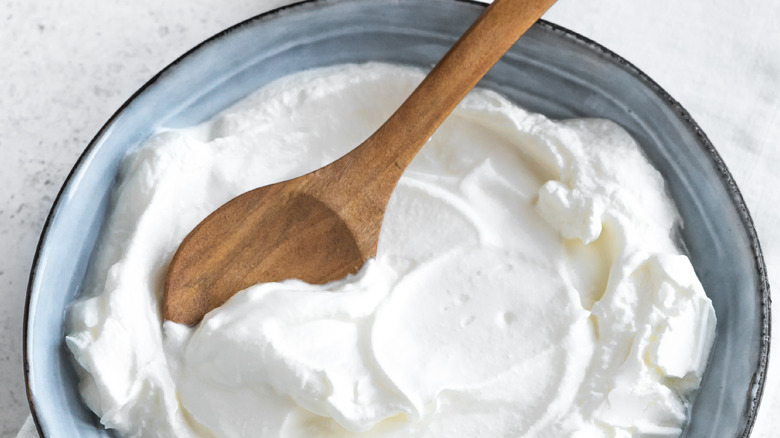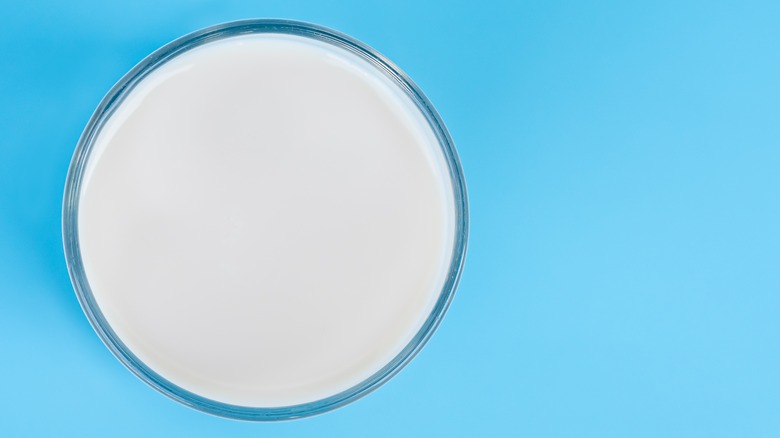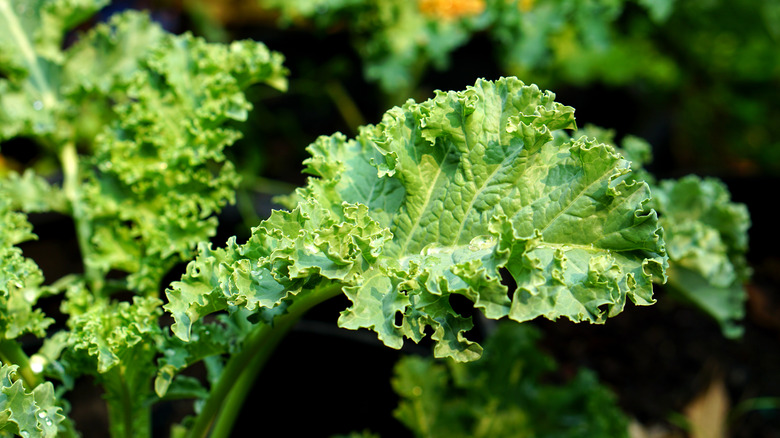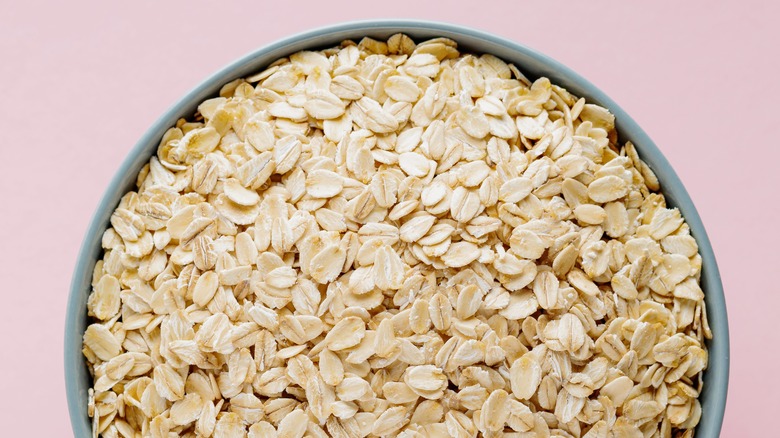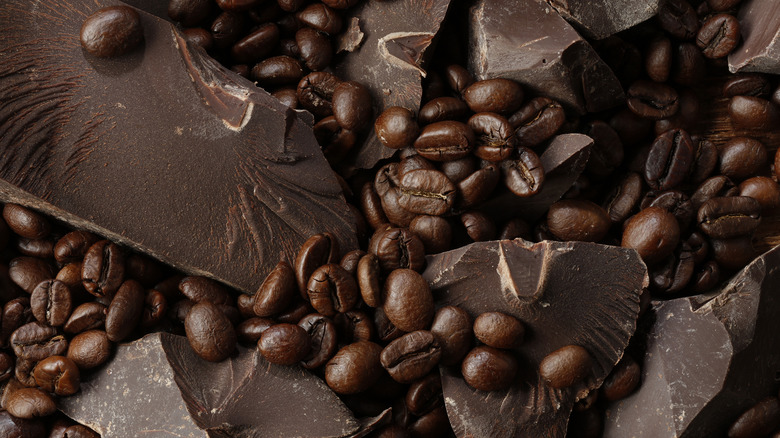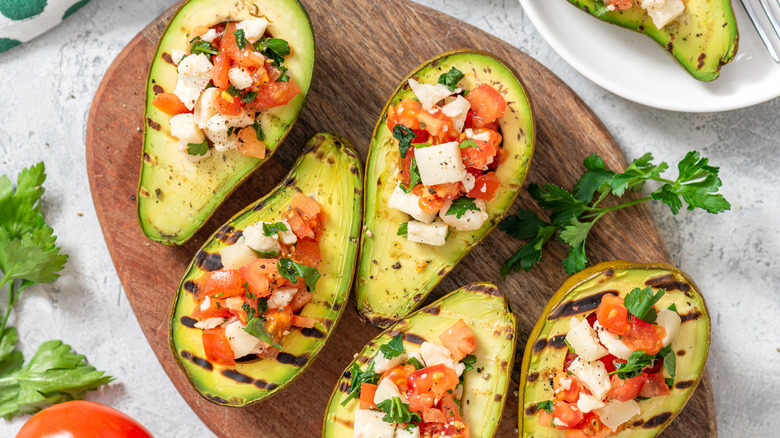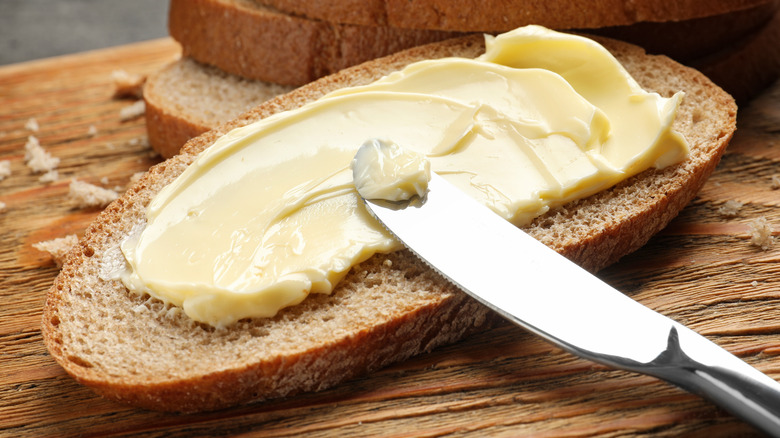7 Foods To Eat And 7 To Avoid For Eczema
Managing eczema is a day-to-day endeavor for millions of people across the country. With around 15 million people in the United States experiencing the skin condition, eczema may not cause lasting harm, but the chronic nature of it can mean that people who have eczema spend a good amount of time managing symptoms, which primarily manifest through inflamed, itchy, swollen, and dry skin (per the Cleveland Clinic). A huge amount of factors can affect the severity and frequency of eczema, including your genetic makeup, smoking, mental health, and any allergies you might have. Your diet will also have a big impact on how you experience eczema.
But the thing is, different types of food can affect our bodies in different ways. Quite frankly, we might know that eating carbs will give us energy, and eating fiber will make us full, but it's not that easy to know exactly how some of these foods will affect our skin. So that's why we decided to take the guesswork out of the equation for you, and put together a list that'll tell you exactly what's on and off the menu if you have eczema.
Eat: Salmon
How long do you have for us to tell you why we love salmon? Oh, not that long ... Okay, we'll get to the point. In addition to salmon's ability to provide quality protein and benefits to your heart and brain health (per BBC Good Food), it's also an incredible food to consume if you have eczema. This is primarily down to the enviable levels of omega-3 fatty acids that sit in the fish. These omega-3 fatty acids have powerful anti-inflammatory effects, with EPA and DHA working to block proteins being made by the body that provoke inflammation, thereby helping those with eczema keep their flare-ups down (per Healthline).
Salmon's protein levels will also keep your skin feeling good. The amino acid building blocks that protein like salmon provides allow our body to make collagen, an essential protein that keeps skin strong and supple (per WebMD). This combination of omega-3 fatty acids and protein is available in a variety of fatty fish, so if salmon's not your favorite, try eating whitebait, sardines, trout, or tuna, says Medical News Today. You can also take a fish oil supplement, which may also be useful in the reduction of eczema symptoms.
Avoid: Bacon
For a lot of people, bacon is the ultimate food: Salty, crunchy, meaty, and pairs well with maple syrup in a combo that can't be beaten. But most of us know that it's not going to win any health awards — and for people with eczema, there's another reason to avoid bacon, thanks to its ability to flare up eczema. Bacon, as processed meat, is especially likely to cause eczema flare-ups, the Cleveland Clinic says. This is thanks to its saturated fat levels, which may interact negatively with our gut microbiome to cause an inflammatory response in our cells, according to research published in Advances in Nutrition.
This, unfortunately, means that people who have eczema shouldn't just stop at bacon. Pretty much all of the processed meats that we know and love have higher levels of saturated fats in them, including sausages, deli meats, jerky, and even the humble burger. That's why it's useful to think about where you're getting your protein from if you have eczema, and to opt for lean protein sources (such as chicken breasts and plant-based proteins like beans) instead.
Eat: Kimchi
It's no wonder that kimchi has taken the world by storm. Not only is it incredibly, sort-of-indescribably delicious, but it's also got a truckload of health benefits to boot (per Healthline). And one of the most incredible aspects of kimchi is its frankly absurd probiotic levels, which, if you have eczema, is going to be your best friend for keeping inflammation down.
Probiotics have been shown to be instrumental in treating eczema in several studies, as the National Eczema Association discusses. More importantly, not only can eczema be reduced by the consumption of probiotics like kimchi thanks to their anti-inflammatory effects, but taking probiotics may also help to prevent the development of eczema in the first place. A study published in The Journal of Allergy and Clinical Immunology examined what occurred when pregnant/breast-feeding mothers who were predisposed to eczema took probiotics, and how it affected their children. It was found that following probiotic consumption, their children were at reduced risk of developing the condition themselves. All the more reason to pick up that jar of kimchi in the store, right?
Avoid: Soy sauce
Soy sauce may be good for many things (not least for adding a boost of salty flavor to your dishes), but keeping eczema down isn't one of them. In fact, soy sauce is one of the worst foods you can be eating in certain circumstances, thanks to the levels of MSG that come in the bottle, according to Well+Good. For folks who have an intolerance to MSG, consuming it can cause your liver to work harder, according to nutritionist Karen Fischer. And when your liver is compromised by having to deal with detoxifying your body, an inflammatory response can happen, triggering a round of eczema.
An MSG intolerance isn't the only thing you should watch out for if you have eczema, though. Other compounds like salicylates, amines, and nitrates can all be tricky for some people to digest, and can prompt eczema flare-ups. This can mean that foods as commonplace as tomatoes, kiwis, oranges, broccoli, and dried fruits could all be problematic in one way or another. It's advisable to monitor your response to certain foods carefully, and omit them from your diet one by one to see if removing them reduces your eczema.
Eat: Yogurt
For real, though, how good is yogurt? Like, we know it's not exactly the most exciting food out there, but let's just talk about it for a sec. It's inexpensive, a great source of protein and calcium, can be virtually fat-free, and it's packed with probiotics that your gut will love you for (per Medical News Today).
People with eczema might be a little cautious about eating yogurt, thanks to the fact that it's a dairy product — and if common wisdom has taught us anything, it's that dairy's bad for your skin, right? Well, not exactly. While it's true that some people may experience eczema flare-ups as a consequence of eating dairy, for other folks, fermented dairy like yogurt and kefir could actually limit your symptoms. A study published in the Journal of Dairy Science examined kefir yeast in particular and found that taking it regularly could help to reduce eczema symptoms. Another study published in Pediatric Allergy and Immunology looked at the effects of eating yogurt during pregnancy and how it would affect an infant's chances of developing eczema — and found that doing so resulted in a smaller chance of having the condition.
Avoid: Full-fat milk
How often have you heard that you shouldn't eat dairy because of your skin? We'd be willing to bet that it's something you might assume is true — and in some ways, it is, but not how you might expect.
Although most talk around dairy is concerning its ability to provoke acne, there's still no clear proof of this, according to WebMD. But where there is a link is between dairy and eczema, with products like full-fat milk potentially causing a breakout of skin inflammation, says Medical News Today.
But before you swear off milk forever, bear in mind that for a lot of people, especially children, the way that dairy causes eczema is through an allergic response, as the NHS discusses. Consuming foods like dairy can cause an immune response in certain individuals, where the body assumes that the food is damaging and creates antibodies that then may prompt eczema, inflammation, and other symptoms. It's important to remember that it's not just dairy that can do this, especially in kids. Eggs, wheat, shellfish, and nuts are all common allergic triggers, and may prompt eczema to appear.
Eat: Kale
There are a lot of reasons to include kale in your diet, folks. This high-fiber, high-nutrient leafy green is as at home in salads as it is in smoothies, and a single cup can provide more of both vitamin A and vitamin C than you need in a day (per Good Housekeeping). And for people who have eczema, kale has one additional component that could make it their skin's best friend.
Kale is especially rich in a flavonoid called quercetin, according to Healthline. In addition to being one of the things that makes kale such a vibrant green, quercetin acts as an antioxidant. As such, eating kale (and the quercetin that comes with it) can have an anti-inflammatory effect, reducing the severity of eczema symptoms as well as fighting free radical damage. Quercetin is also a natural antihistamine, reducing your immune response and the potential inflammation that may come with it. If kale's not your thing, the good news is that quercetin is also available in abundant quantities in a range of other fruits and vegetables, including fellow leafy green spinach, broccoli, blueberries, and cherries.
Avoid: Oats
On the surface of things, it might seem like oats are a great choice for pretty much anyone. Nutritious, filling, a great source of fiber, super-cheap, and super-versatile (yes, we love oats, okay?). But! If you've got eczema, there's a big reason why you might not get on with oats: Their nickel levels.
Oats, as well as other types of grains like unpolished brown rice, wheat, and buckwheat, are especially high in the metal, according to WebMD. And this can create a serious problem for people with eczema, as consuming nickel can be a trigger for hand eczema in particular, says research published in the Indian Journal of Dermatology.
It's for this reason that researchers suggest following a low-nickel diet for skin health when you have eczema. It might also be worth keeping an eye on a few other foods to avoid nickel in your diet, like certain types of seafood (e.g., shrimp and crawfish), chickpeas, lentils, and peanuts. It's also worth bearing in mind that nickel's not just problematic when you eat it: For people with eczema, nickel can also prompt a reaction if you're touching jewelry or equipment made from the metal.
Eat: Dark chocolate
Oh, we just love it when we can deliver good news. And this news might be the best of all: If you have eczema, dark chocolate is something that you can keep on the menu.
Dark chocolate, with its high concentration of polyphenols and flavanols, is full of anti-inflammatory capacity that will assist your skin in remaining calm, says Medical News Today. Of particular note is a study published in Frontiers in Immunology, which examined the effects of dark chocolate on the body. It found that the polyphenols in dark chocolate and cocoa can help to reduce inflammation by assisting the gut microbiome to flourish. Honestly, when food is that downright helpful? We can't get enough.
And that's not the only reason to keep dark chocolate in your diet. The health benefits of everyone's favorite sweet treat are almost too numerous to list. In addition to its anti-inflammatory capacities reducing eczema, they may also protect proper brain function, Medical News Today states. The flavonols in dark chocolate, meanwhile, may assist in reducing cholesterol levels and maintaining healthy blood pressure. Just make sure that when you're buying your bar, you're opting for dark chocolate that's higher in cocoa, and therefore higher in all the good stuff.
Avoid: Candy
Let's be real: We all know that candy's not good for us. Anything that's that artificially bright in color and lip-smackingly sweet isn't exactly going to imbue us with wellness. But it's wise to be a little more cautious around candy if you have certain health conditions — and eczema's one of them, thanks to candy's sky-high levels of sugar. Consuming too much sugar can wreak havoc on your blood sugar and insulin levels, says Healthline. And when insulin levels rise, inflammation can soon follow, leaving your atopic dermatitis in a worse position than it was before.
As such, it's useful to limit your candy intake, to make sure that you're not putting your body and skin through unnecessary inflammation. Watch out for other sources of added sugar in your diet, too, which can come through desserts, sodas, additions to drinks like coffee and tea, and even in some savory foodstuffs. It can also be useful to shift the focus of your diet more holistically, minimize foods that cause inflammation, and favor foods that reduce it, as Healthline discusses.
Anti-inflammatory diets like the Mediterranean diet prioritize antioxidant-rich foods like fruit and vegetables, with healthy fats and proteins being a staple of the menu. These help with not just eczema, but also other chronic conditions like arthritis (per the Arthritis Foundation).
Eat: Avocado
Yes. We know. Another article saying that avocado is something you should be eating. But honestly, can you blame us? Avocados are pretty good for you, folks, and when it comes to eczema, they could be especially beneficial.
There are two reasons why avocados could be a great addition to your diet if you have atopic dermatitis: their fiber levels and their quantity of healthy fats, both of which are abundant in the fruit (per the Harvard T. H. Chan School of Public Health). Consuming more fiber has been seen to benefit people with eczema by reducing the severity of symptoms and sensitivity to allergies by bolstering the skin barrier, via a study published in Mucosal Immunology. The monounsaturated fats in avocados, meanwhile, could assist in reducing inflammation (per Healthline), thereby bringing down eczema symptoms.
It's not all good news for avocados, however. These fleshy fruits are also particularly high in two compounds — amines and salicylates — which might be a trigger for eczema in some individuals who are intolerant to them, as Well+Good states. As such, it's worth introducing avocados to your diet slowly, and seeing whether there are any adverse effects on your skin before you start buying them by the armload.
Avoid: Margarine
As a stand-in for butter, margarine is hard to beat in terms of versatility and all-around taste. But if you're someone who has eczema, it might be worth skipping that margarine tub next time you're at the store.
Margarine is especially rich in trans fats, which are pretty much the unhealthiest fats out there, and can skyrocket your bad cholesterol levels and increase the risk of heart disease (per the Mayo Clinic). One other impact of trans fats is that they can increase inflammation in the body, including in the skin, and therefore can make your eczema symptoms more severe (via Everyday Health).
Trans fats can also show up in troubling quantities in everyday foods like fried goods, so remember that those could be a trigger for your eczema, too. The good news is that not all types of fat are inflammatory, and certain fats like omega-3s can have anti-inflammatory effects that your skin will thank you for. Monounsaturated fats, which come in sunflower, canola, and olive oil (per the Mayo Clinic), may also have anti-inflammatory properties.
Eat: Coffee
Who'd have thought that a simple cup of coffee could have so much goodness? In that morning cup of Joe, you'll find nutrients and compounds that can assist in maintaining healthy blood sugar, boosting your metabolism, and even potentially helping you live longer, according to BBC Good Food. Plus, the caffeine that wakes you up so effectively in the morning (well, some mornings, anyway) may also have powerful benefits to your skin, especially if you have eczema, according to research conducted by Alfaisal University and Mount Sinai Health System (via the British Association of Dermatologists).
The researchers discussed their findings on how caffeine works to reduce skin inflammation by maintaining regular molecule levels in the skin and preventing skin cells from dying. The notable effect that caffeine has, the scientists said, could also have a bearing on treating psoriasis, another skin condition caused by inflammation that can result in dry, flaky skin (per the National Psoriasis Foundation). While caffeine is not yet viewed as a primary treatment to reduce inflammation, study co-author Mais Alashqar said that adding it to topical creams or lotions would be "a simple step that could significantly benefit the many patients around the world that suffer from inflammatory skin conditions like eczema or psoriasis."
Avoid: Vanilla
When we think of foods that might have a less-than-pleasing bearing on our health, we tend to cast our minds towards fried foods, salty snacks, and sugary cereals. What we don't tend to think about, however, are natural flavorings and spices like vanilla. But this innocuous spice, added to sweet dishes around the world, could be particularly troublesome for people with eczema, thanks to the plant's relationship to balsam of Peru (via Everyday Health).
An aromatic sap, balsam of Peru can trigger a range of allergic responses in people, and the plant residue contains the vanillin compound — which, you guessed it, is also present in vanilla. As such, if you've ever had an allergic response to balsam of Peru, it may also be the case that vanilla and vanilla extracts can instigate an inflammatory response, which is the last thing any person with eczema wants.
Additionally, keep in mind that other spices like cloves and cinnamon may also contain compounds that are found in balsam of Peru. Thus, they may also trigger skin inflammation when they are ingested or touched.
